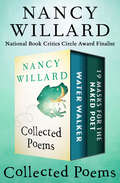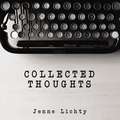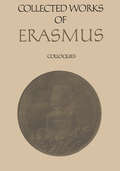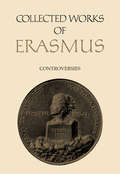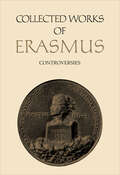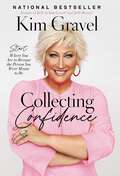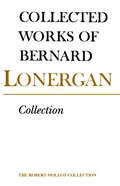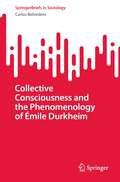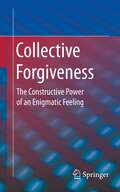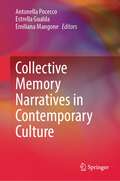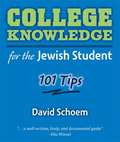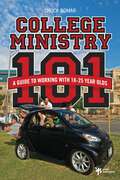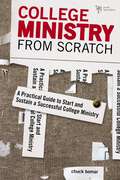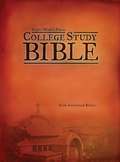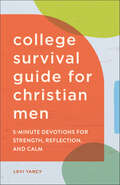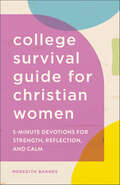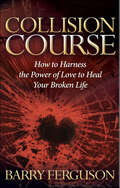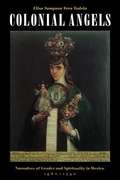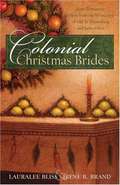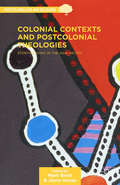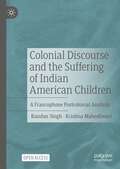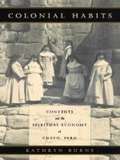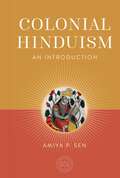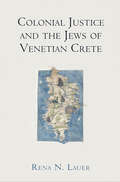- Table View
- List View
Collected Poems: Water Walker and 19 Masks for the Naked Poet
by Nancy WillardThe lyrical poems of award-winning author Nancy Willard celebrate the magic of life Nancy Willard, who was the first recipient of a Newbery Medal for a volume of poetry, displays her versatility in these companion collections.Divided into five sections, Water Walker blends the mundane with the mystical. From sleeping fish to Marco Polo to a tortoise who dispenses unique advice to a bride on her wedding day, these poems integrate fables, nursery rhymes, hymns, and songs.In 19 Masks for the Naked Poet, the human soul reveals itself, as we remove the disguises that bind (and blind) us to everyday life. Fanciful images of nature—dozing bees, green lions—infuse this collection. Doors become mirrors and husbands float above their marital beds as Willard explores themes of family, love, spirituality, politics, and immortality. Her &“poet&” experiences everything from the sacred to the profane, from photographing his heart to meeting God in creations that are enchanting and surreal. This ebook includes illustrations by Regina Shekerjian.
Collected Thoughts
by Jenne LichtyA gathered bunch of random musings on topics affecting many women today: from marriage, momming, special needs, faith and everything in between, Jenne approaches the gory and glory in it all letting her funny bone lead the way. Running the gamut from inspirational and thought-provoking to laugh-out-loud funny, every entry is authentic and true to life. Written in quick, easy-to-read selections in the social media standard that so many are used to today, each entry provides a lighthearted pick-me-up or a mind snack to chew on throughout the day.
Collected Works of Erasmus Volume 39 and Volume 40
by Desiderius Erasmus Craig R. ThompsonErasmus's familiar colloquies grew from a small collection of phrases, sentences, and snatches of dialogue written in Paris about 1497 to help his private pupils improve their command of Latin. Twenty years later the material was published by Johann Froben (Basel 1518). It was an immediate success and was reprinted thirty times in the next four years. For the edition of March 1522 Erasmus began to add fully developed dialogues, and a book designed to improve boys' use of Latin (and their deportment) soon became a work of literature for adults, although it retained traces of its original purposes. The final Froben edition (March, 1533) had about sixty parts, most of them dialogues.<P><P> It was in the last form that the Colloquies were read and enjoyed for four centuries. For modern readers it is one of the best introductions to European society of the Renaissance and Reformation periods, with lively descriptions of daily life and provocative discussions of political, religious, social, and literary topics, presented with Erasmus's characteristic wit and verve. Each colloquy has its own introduction and full explanatory, historical, and biographical notes.
Collected Works of Erasmus: Controversies (Collected Works of Erasmus #75)
by Desiderius Erasmus Cardinal Flahiff Basilian CentreDespite having enemies in the powerful Spanish religious orders, and being warned of the controversies that would arise, Erasmus published the fourth edition of his New Testament in 1527, resulting in a major crisis for Erasmianism in Spain. This period is marked by a bitter battle between Erasmus and the conservative elements in Spain, involving behind-the-scenes maneuvering, where it was impossible to distinguish friend from foe. Following this tension, a confrontation culminated in the Valladolid conference where enemies of Erasmus were obliged to come forward, and where, following these events, Erasmus himself was forced to publically respond to the charges brought against him. The three texts in the present volume: An Apologia of Desiderius Erasmus of Rotterdam Against a Number of Articles Presented by Certain Monks in Spain; The Answer of Desiderius Erasmus to the Pamphlet of a Certain Fever-ridden Individual; and, Letter to Certain Highly Impudent Jackdaws were written in response to his critics.
Collected Works of Erasmus: Controversies, Volume 74 (Collected Works of Erasmus #74)
by Desiderius ErasmusErasmus’ thorough engagement with the New Testament, in particular his revision of the Vulgate translation, aroused much controversy, especially in the orthodox Roman Catholic country of Spain. Erasmus had to fight fierce polemics with several people, including two Spanish scholars, Diego López Zúñiga and Sancho Carranza de Miranda, who were both connected to the University of Alcalà. This quarrel lasted from 1520 to 1524, with a late response by Erasmus in 1529. The discussion started as a philological one, regarding "correct" Latin, but turned into a dogmatic-theological fight over the issues of whether the New Testament speaks of Christ as God, whether one can apply the term servus (servant) to Christ, and whether the sacramental character of matrimony can be deduced from Ephesians 5:32. The six texts in this volume are here translated and annotated for the first time. With elucidating notes and an introduction, the volume offers wonderful insight into a fierce and fundamental polemic over the New Testament
Collecting Confidence: Start Where You Are to Become the Person You Were Meant to Be
by Kim GravelShowcasing the confidence she's gathered from her own life journey, Kim Gravel--beloved QVC star and creator of Belle by Kim Gravel and Belle Beauty--invites you to look at yourself with a fresh new lens, encouraging you to start where you are and become the person you were meant to be.In Collecting Confidence, Kim reminds you that you are not your current circumstance. You are not your current habits. Where you are right now is, in fact, simply your starting place to become who you&’re meant to be. If you&’ve lost your way and forgotten who you are, this book will equip you to glean empowerment from life&’s lowest moments.blend down-home wisdom with laugh-out-loud humor.inspire you with no-holds-barred stories from Graceland to Piggly Wiggly.help you understand the importance of how you see yourself.change your perspective to realize mistakes can be stepping stones. Now is the time to be still, listen to God, and start collecting confidence one step, one lesson, one experience, and even one mistake at a time. As Kim says, &“You can&’t be authentic in the world if you can&’t be real with yourself.&” Collecting Confidence is a sumptuous collection of life experiences, hard-earned wisdom, and unexpected blessings.
Collection: Volume 4
by Bernard Lonergan Robert Doran, S.J. Frederick Crowe, S.J.Collection contains short works that span Lonergan's work from 1943 to 1965. The papers deal with scientific, mathematical, theological, and philosophical questions, including discussions of such topics as the proper foundation of metaphysics, the form of inference, the nature of love and marriage, and the role of the university in the modern world.
Collective Consciousness and the Phenomenology of Émile Durkheim (SpringerBriefs in Sociology)
by Carlos BelvedereThe book is addressed to scholars and students in sociology and in phenomenological philosophy. It presents the work of Durkheim in a new light and discusses the prevailing interpretations in the collective intentionality approach. It also provides a fresh conception of collective consciousness which illuminates features unattended by the traditions initiated by John Searle, Dan Zahavi and the Center for Subjectivity Research, and the Nordic Society of Phenomenology. This lucidly written book is of interest to students and scholars researching Durkheim's, Husserl’s and Schutz’s works.
Collective Forgiveness: The Constructive Power of an Enigmatic Feeling
by Oliver ErrichielloIn this age of a hyper-complex and totally interconnected world that no longer knows pauses, forgiveness is essential. The author explains that collective forgiveness is in no way inferior to love in its mysteriousness. We humans are unfathomable beings. Although we usually act thoughtfully and rationally, many actions and decisions cannot seem to be logically derived. Forgiveness - everyone knows it and has experienced it - is one of them. Forgiveness is one of the most important and exciting phenomena of human communication. The book answers questions such as: Why do we forgive some people and not others? Why does forgiveness take time? Why have people always forgiven each other - or rejected the very act of forgiving? Do we forgive individuals in a personal environment more easily or we more hesitant than with a group of people? And most importantly, why is collective forgiveness effective across time and cultures? The book is thought-provoking and offers valuable impulses to better understand one's own and social actions.This book is a translation of the original German 1st edition Kollektives Verzeihen by Oliver Errichiello, published by Springer-Verlag GmbH, DE, part of Springer Nature in 2021. The translation was done with the help of artificial intelligence (machine translation by the service DeepL.com). A subsequent human revision was done primarily in terms of content, so that the book will read stylistically differently from a conventional translation. Springer Nature works continuously to further the development of tools for the production of books and on the related technologies to support the authors.
Collective Memory Narratives in Contemporary Culture
by Emiliana Mangone Antonella Pocecco Estrella GualdaStarting from the central importance of memory in contemporary societies, this book encourages a transdisciplinary reflection on how the “presentification of the past” is never a simple reenactment but corresponds to the interaction between memory and cultural sensitiveness, present beliefs and needs, expectations, and forecasts for the future. It studies cultural (re)construction through collective stories, including academic debates, media narratives, collective mobilizations, state narratives of history, architectural reconstructions, and artistic expressions. It looks at how technological innovations have profoundly changed the practices of conservation and dissemination of collective memory, with particular reference to cultural digitization. Finally, it shows that the relevance and selection of events, the organization of connections and cross-references between past, present, and future, as well as the importance of diversified collective imaginaries are the keys to narrative constructions of memory that prove to be sensitive and decisive for its continuity and its intergenerational transmission. This interdisciplinary collection is for students and scholars of the social sciences, cultural studies, and the humanities interested in memory studies.
College Knowledge for the Jewish Student: 101 Tips
by David Schoem"Students and parents alike will benefit from reading David Schoem's well-written, lively, and documented guide. " ---Elie Wiesel “This is a wonderful sequel to Schoem’s very successful College Knowledge: 101 Tips. As I read through this new volume, I was constantly struck that the advice offered would help all students who approach the college experience with distinctive cultural backgrounds and commitments. Indeed all prospective college students, and their parents, can benefit from this serious yet delightful, well-written and incisive book of advice. I intend to buy one for each of my grandchildren. ” ---Harold Shapiro, former president, Princeton University; former president, University of Michigan For the individual Jewish student who enters college, it is critical that he or she come intellectually, emotionally, and spiritually prepared for the academic and social experience that awaits. College is a qualitatively different experience than high school, and students’ expectations need to be set appropriately. The transition from high school to college is so significant that it can be difficult for most without some preparation. College Knowledge for the Jewish Student: 101 Tips is the perfect guide for students heading off to college with high expectations for learning, academic success, personal growth, and independence. Through lively tips and compelling student stories about life at college, it offers thoughtful, practical information for every Jewish student who wants to make a successful transition. College Knowledge for the Jewish Student includes tips on the academic aspects of college life, like communicating with faculty, learning what is where on campus, where to go for help with coursework, how to manage one’s time for a balanced experience, etc. In addition, it offers advice on dealing with family, finances, health, and safety, as well as the many social and emotional aspects of this important rite of passage.
College Ministry 101: A Guide to Working with 18-25 Year Olds (Especialidades Juveniles Ser.)
by Chuck Bomar18-25-year-olds are trying to find their place in society while living through an array of experiences that force them to reevaluate beliefs and assumptions they were raised with, which leads many students to disconnect from the church after high school. College Ministry 101 will help church leaders understand the college-age-stage in order to better minister to their needs. This book will provide leaders with practical ministry philosophies about how to effectively minister to college students through mentor relationships, what students need in their day-to-day lives, how to work with volunteers in college ministry, and how to turn college-age students into genuine disciples.
College Ministry from Scratch: A Practical Guide to Start and Sustain a Successful College Ministry
by Chuck BomarOut from Under: equipping kids for life out of the shelter of youth group This book dives into our youth ministries, helping youth workers think intentionally about developing a ministry that is geared toward helping prepare kids for what’s to come. This begins by helping them intentionally think through what it is kids will be facing and then helping them think through preparation for those times. This book dives into ministry philosophies that help or hinder this preparation.
College Study Bible: New American Bible
by Virginia Halbur Saint Mary's Press StaffThis College Study Bible was created to meet the academic and spiritual needs of students taking undergraduate Scripture or theology courses and those studying the Bible for the first time. Its many features foster authentic biblical interpretation; make connections between Scripture, Tradition, and life experience; and promote spiritual growth. Features include: Introductory articles on how to read and understand the Bible, along with the Vatican Council II document Dogmatic Constitution on Divine Revelation ( Dei Verbum, 1965) Scholarly introductions to each section and book of the Bible, written and edited so that unfamiliar concepts and customs are easy to understand Ninety short articles that address the social concerns, life issues, and spiritual needs of a student In-text maps, illustrations, charts, biblical art, and photos throughout the Bible to provide a visual context to aid student understanding.
College Survival Guide for Christian Men: 5-Minute Devotions for Strength, Reflection, and Calm
by Levi YancyKeep God close throughout college College can be an exciting and overwhelming time, full of big changes and new experiences. This devotional for men makes it easy to carve out moments of calm and stay connected to faith as you discover everything college has to offer.What sets this college survival guide apart from other college books:Short and sweet—Bolster your faith in just a few minutes with quick devotions designed to complement the busy life of any college student.Relevant topics—Explore a wide range of Bible passages and discover how God can provide guidance on everything from dating to living with purpose.Thoughtful prompts—Reflect on the Lord's wisdom and consider how to apply His lessons to your life with insightful, open-ended questions at the end of every devotion.Foster your faith and find support as an undergrad with the College Survival Guide for Christian Men.
College Survival Guide for Christian Women: 5-Minute Devotions for Strength, Reflection, and Calm
by Meredith BarnesKeep God close throughout college College can be an exciting and overwhelming time, full of big changes and new experiences. This book of devotions for women makes it easy to carve out moments of calm and stay connected to your faith as you discover everything college has to offer.What sets this college survival guide apart from other college books:Short and sweet—Bolster your faith in just five minutes with quick devotions designed to complement the busy life of any college woman.Relevant topics—Explore a wide range of Bible passages and discover how God can provide guidance on personal boundaries, peer pressure, and more.Thoughtful prompts—Reflect on the Lord's wisdom and consider how to apply His lessons to your life with insightful, open-ended questions at the end of every devotion.Foster your faith and find support as an undergrad with The College Survival Guide for Christian Women.
Collision Course: How to Harness the Power of Love to Heal Your Broken Life
by Barry FergusonDiscover The Secret To Transforming Your LifeIs your life spiraling out of control? Have you tried everything to heal the pain you feel deep inside, but still feel lost and lonely?Barry Ferguson takes you on a fantastic journey of discovery through his own transformation by weaving his personal story with a proven step-by-step roadmap that will heal even the most hardened of hearts. After nearly dying in two separate car accidents during a six-week period, Barry set off on a quest to completely change his life and find his true calling. What he found has been distilled into an easy to digest, faith-based guide to living a heart-centered life built upon God’s unconditional love.Despite his many failures in life, Barry has learned from his mistakes and helps others do the same. He believes that everyone deserves to be loved…including you. Digging deep into his own disappointments, Barry gives an authentic account of resurrection from the depths of his own broken life to inspire others in becoming the people God wants them to be.Collision Course is an incredible resource for any follower of Jesus who has felt a crisis of faith at one time or another, as well as for those who are new to the Christian journey. Barry shows how the journey of life is more important than the destination, and everything you need to succeed in life comes from God.If you died today, could you honestly say you gave more love than you took?What would you do to change the equation?
Colloquies on Society
by Robert SoutheyA 19th-Century author examines the questions of society in the form of discussions with the ghost of Sir Thomas More.
Colonial Angels: Narratives of Gender and Spirituality in Mexico, 1580-1750
by Sampson Vera Tudela ElisaThe author argues that the New World context necessitated the creation of a new kind of writing. Drawing on previously unpublished writings by and about nuns in the convents of Mexico City, she investigates such topics as the relationship between hagiography and travel narratives, male visions of the feminine that emerge from the reworking of a nun's letters to her confessor into a hagiography, the discourse surrounding a convent's trial for heresy by the Inquisition, and the reports of Spanish priests who ministered to noble Indian women. This research rounds out colonial Mexican history by revealing how tensions between Spain and its colonies played out in the local, daily lives of women.
Colonial Christmas Brides
by Lauralee Bliss Irene B. BrandFor Colonial settlers in Jamestown and Williamsburg who were enduring the hardships of carving a home out of the wilderness, Christmas was a reminder of where they came from and their hope for the future. But for some, finding the faith and joy necessary for celebration is a daunting task. Susanna's introduction to America is on a bride ship. Paul lost his livelihood in a fire. Raven is to be married off to a much older man. Mary grieves her husband's murder. Can these lonely souls open their hearts to the gift of love?
Colonial Contexts And Postcolonial Theologies: Storyweaving in the Asia-Pacific (Postcolonialism and Religions)
by Jione Havea Mark G. BrettColonial Contexts and Postcolonial Theology focuses on what postcolonial theologies look like in colonial contexts, particularly in dialogue with the First Nations Peoples in Australia and the Asia-Pacific. The contributors have roots in the Asia-Pacific, but the struggles, theologies and concerns they address are shared across the seas.
Colonial Discourse and the Suffering of Indian American Children: A Francophone Postcolonial Analysis
by Kundan Singh Krishna MaheshwariEuro-American misrepresentations of the non-West in general, and in particular on Hinduism and ancient India, run deep and have far greater colonial connections than that have been exposed in academia. This book analyzes the psycho-social consequences that Indian American children face after they are exposed to the school textbook discourse on Hinduism and ancient India. The authors show that there is an intimate connection—an almost exact correspondence—between James Mill’s colonial-racist discourse and the current school-textbook discourse. The very parameters and coordinates on which James Mill constructed the discourse are the ones that are being used to describe Hinduism, Hindus, and ancient India in the textbooks currently. Consequently, this archaic and racist discourse, camouflaged under the cover of political correctness, produces in the Indian American children a psychological impact quite similar to what racism is known to produce: shame, inferiority, embarrassment, identity confusion, assimilation, and a phenomenon similar to racelessness where the children dissociate from the tradition and culture of their ancestors. This book argues that the current school textbook discourse on Hinduism and India needs to change so that the Indian American children do not become victims of overt and covert racism. For the change to occur, the first step is to recognize the overarching and pervasive influence of the colonial-racist discourse of James Mill on the textbooks. For the reconstruction of the discourse to take place, the first step is to engage in a through deconstruction, which is what the book attempts.
Colonial Habits: Convents and the Spiritual Economy of Cuzco, Peru
by Kathryn BurnsIn Colonial Habits Kathryn Burns transforms our view of nuns as marginal recluses, making them central actors on the colonial stage. Beginning with the 1558 founding of South America's first convent, Burns shows that nuns in Cuzco played a vital part in subjugating Incas, creating a creole elite, and reproducing an Andean colonial order in which economic and spiritual interests were inextricably fused. Based on unprecedented archival research, Colonial Habits demonstrates how nuns became leading guarantors of their city's social order by making loans, managing property, containing "unruly" women, and raising girls. Coining the phrase "spiritual economy" to analyze the intricate investments and relationships that enabled Cuzco's convents and their backers to thrive, Burns explains how, by the late 1700s, this economy had faltered badly, making convents an emblem of decay and a focal point for intense criticism of a failing colonial regime. By the nineteenth century, the nuns had retreated from their previous roles, marginalized in the construction of a new republican order. Providing insight that can be extended well outside the Andes to the relationships articulated by convents across much of Europe, the Americas, and beyond, Colonial Habits will engage those interested in early modern economics, Latin American studies, women in religion, and the history of gender, class, and race.
Colonial Hinduism: An Introduction (The Oxford Centre for Hindu Studies Mandala Publishing Series)
by Amiya P. SenIn a tightly woven narrative, historian of modern India Amiya P. Sen traces the shifting self-understanding of Hindus in the light of the many challenges posed by the British colonial encounter, offering an accessible yet analytically rich book on the birth and development of modern Hinduism, which will be of interest to students and the interested general reader alike.Change has been endemic to Hindu cultural life from its inception. It was nevertheless in the modern era, with the advent of British colonial rule in India, that this change had its most far-reaching consequences, profoundly shaping the landscape of Hinduism as we encounter it today. In Colonial Hinduism: An Introduction, Amiya P. Sen charts this many-layered historical process in a refreshingly accessible narrative. Over seven chapters, this book traces the shifting self-understanding of the Hindus in the light of new challenges posed by the West. This encounter brought forth a new Hindu consciousness that was prepared to critique India&’s perceived past irrationalities and superstitions but also reject what it took to be the excesses of the materialistic West. Over the years, a surging Hindu nationalism and anti-colonial sentiment sought to counter the material advances of the West with the self-acclaimed spiritual excellence of India in order to to secure for India a rightful place within global civilisation. In time, however, Hindu nationalism produced its own excesses, the ramifications of which India is still contending. Colonial Hinduism: An Introduction fulfils the long standing need for an accessible yet analytically rich book on the birth and development of modern Hinduism, which will be of interest to students and the interested general reader alike. OXFORD CENTRE SERIES: The Oxford Centre for Hindu Studies Publishing Series offers authoritative yet accessible introductions to a wide range of subjects in Hindu Studies. Each book in the series aims to present its subject matter in a form that is engaging and readily comprehensible to persons of all backgrounds – academic or otherwise – without compromising scholarly rigour. The series thus bridges the divide between academic and popular writing by preserving and utilising the best elements of both. Other books in the series include The Bhagavad Gita: A New Translation and Study Guide; The Hindu Temple and Its Sacred Landscape; and Women in the Hindu World. EXPERT AUTHOR: Amiya P. Sen, PhD, is a historian with an interest in the intellectual and cultural history of modern India. Sen has been Agatha Harrison Fellow at the University of Oxford, Shivdasani Fellow at the Oxford Centre for Hindu Studies, Heinrich Zimmer Chair at the University of Heidelberg, and Fellow at the Indian Institute of Advanced Study, Shimla, and the Nehru Memorial Museum & Library, New Delhi, He has served the Universities of Delhi, Visva Bharati, Santiniketan, and Jamia Millia Islamia, New Delhi. EDUCATION AID: With the integration of discussion questions, suggested further reading, glossary of terms, and images throughout, this book serves as a comprehensive resource for both classwork and independent study of modern Hinduism.
Colonial Justice and the Jews of Venetian Crete (The Middle Ages Series)
by Rena N. LauerWhen Venice conquered Crete in the early thirteenth century, a significant population of Jews lived in the capital and main port city of Candia. This community grew, diversified, and flourished both culturally and economically throughout the period of Venetian rule, and although it adhered to traditional Jewish ways of life, the community also readily engaged with the broader population and the island's Venetian colonial government.In Colonial Justice and the Jews of Venetian Crete, Rena N. Lauer tells the story of this unusual and little-known community through the lens of its flexible use of the legal systems at its disposal. Grounding the book in richly detailed studies of individuals and judicial cases—concerning matters as prosaic as taxation and as dramatic as bigamy and murder—Lauer brings the Jews of Candia vibrantly to life. Despite general rabbinic disapproval of such behavior elsewhere in medieval Europe, Crete's Jews regularly turned not only to their own religious courts but also to the secular Venetian judicial system. There they aired disputes between family members, business partners, spouses, and even the leaders of their community. And with their use of secular justice as both symptom and cause, Lauer contends, Crete's Jews grew more open and flexible, confident in their identity and experiencing little of the anti-Judaism increasingly suffered by their coreligionists in Western Europe.
